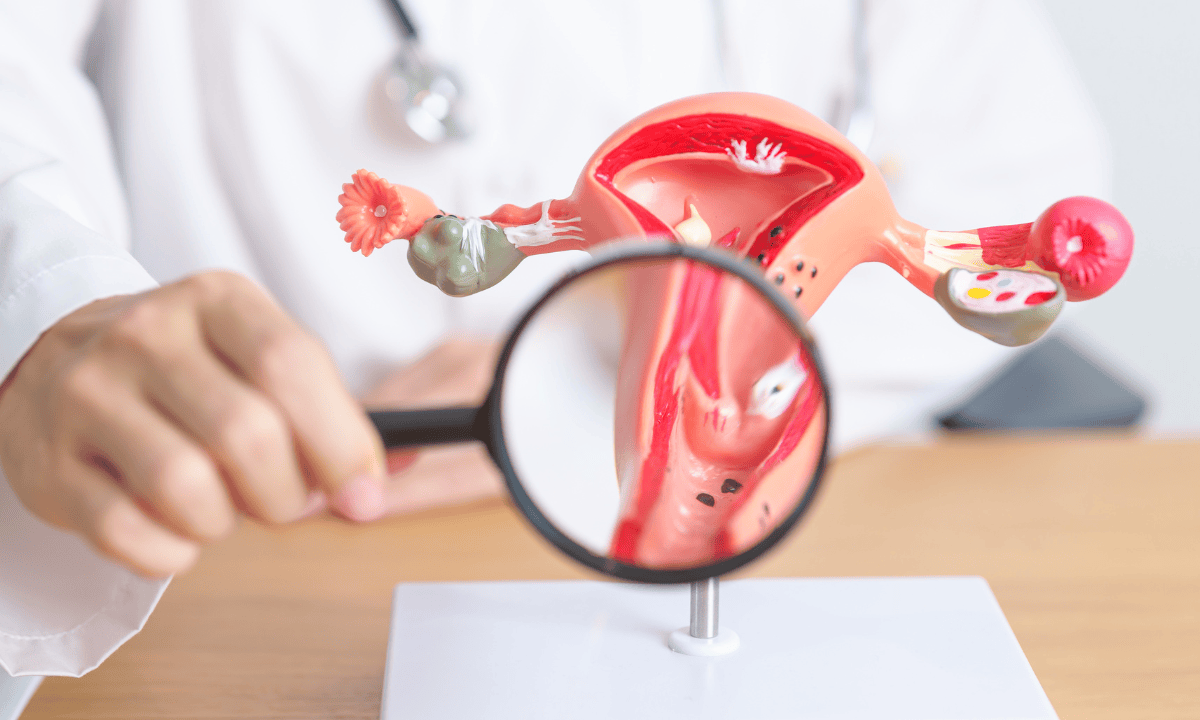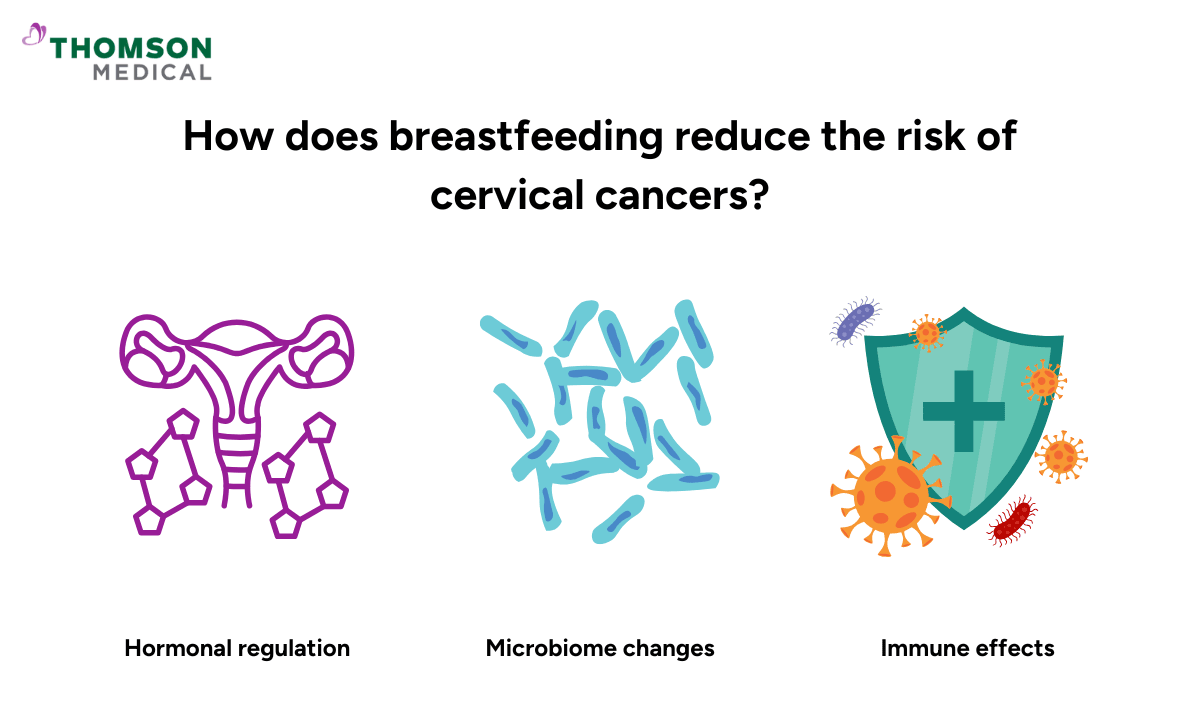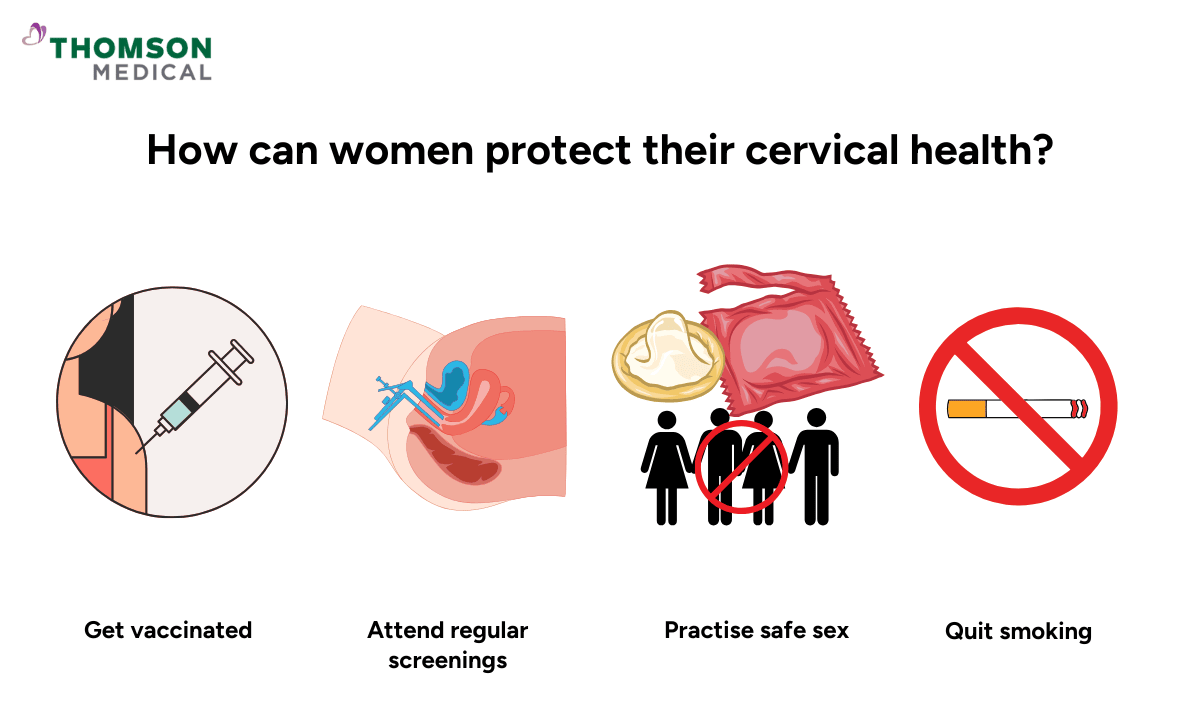It’s estimated that every year, 309 women in Singapore are diagnosed with cervical cancer. If you're breastfeeding or planning to, you might wonder ‘Could something as natural as breastfeed your baby actually protect you from cancer?’
The answer isn't simple. While breastfeeding has been proven to lower your risk of breast and ovarian cancers, its role in preventing cervical cancer remains less clear. So, what does the science actually say about breastfeeding and cervical health?
What is cervical cancer?

Cervical cancer starts in the cervix, the lower part of the uterus (womb) that connects to the vagina. It's almost always caused by a persistent infection with HPV infection. Most cervical cancers develop slowly over many years, starting as precancerous cervical lesions (abnormal cells) that can be detected through a Pap test.
Why is breastfeeding important for women’s health?
Breastfeeding provides several immediate benefits for you as a new mother:
Helps your body recover after birth:
When you breastfeed, your body releases a hormone called oxytocin. This helps your womb (uterus) go back to its normal size and reduces heavy bleeding after delivery.
Keeps you calm:
Breastfeeding releases hormones which promote relaxation and help reduce your anxiety and stress.
Helps you lose pregnancy weight:
Producing breast milk uses up extra calories, so many mothers find it easier to get back to their old weight.
Builds a strong bond with your baby:
Skin-to-skin contact or holding your baby close while breastfeeding makes both of you feel loved and connected.
Women who breastfeed have a lower risk of diabetes, and heart disease. It may also reduce your chances of getting weak bones (osteoporosis), endometriosis, arthritis, and memory problems (Alzheimer's disease) when you're older.
How might breastfeeding influence the risk of cervical cancer?

Breastfeeding may affect your cervical cancer risk in a few ways:
Hormonal effects:
Breastfeeding keeps the female hormones – oestrogen and progesterone – at lower levels. High levels of these hormones have been linked to certain cancers.
Some studies show that breastfeeding for a longer time may help lower the risk of cervical cancer, but this link is not fully proven yet.
Microbiome changes:
Hormonal shifts during breastfeeding can alter your vaginal microbiome (the bacteria that helps maintain vaginal health).
When these good bacteria are present in the right balance, they can prevent harmful germs from growing.
Some types good bacteria, like L. gasseri, may even help the body clear HPV infections more quickly.
Immune effects:
Breast milk contains antibodies, white blood cells, and antiviral proteins. These help protect the baby from many infections.
While breastfeeding keeps the mother healthy overall, there is no strong proof that it helps her body get rid of HPV.
What are the main risk factors for cervical cancer?
Several factors increase the likelihood of developing cervical cancer:
Persistent HPV infection
Smoking that can harm cervical cells
HIV or medicines that weaken the immune system
Long-term use of oral contraceptives
Having many sexual partners or starting sexual activity at a young age
Other sexually transmitted infections (STIs) such as chlamydia, herpes, or gonorrhoea
Our women's cancer specialists
Loading...
How can women protect their cervical health?

You can take several practical steps to reduce your risk of cervical cancer:
Get vaccinated:
The HPV vaccine protects against the virus that causes most cervical cancers.
It is recommended to get vaccinated at the age of 9 and still beneficial to get vaccinated up to age 26.
Attend regular screenings:
HPV and Pap tests can find early changes in the cervix before they turn serious.
How often you need these tests depends on your age and health history.
Practise safe sex:
Use condoms consistently, and limit the number of sexual partners to reduce HPV exposure.
Quit smoking:
Stop smoking improves your body's ability to clear HPV and reduces the risk of cervical cell damage.
Remember that breastfeeding supports overall health but should not replace medical prevention of cervical cancer.
If you haven’t had your HPV vaccination or cervical cancer screening, request an appointment with Thomson Medical. Our doctors will review your medical history, assess your risk, and guide you on the best protection methods for long-term cervical health.
What should you do if diagnosed with cervical cancer while breastfeeding?
If you are diagnosed with cervical cancer while breastfeeding, talk to your doctor right away about your treatment options and your baby’s safety.
Some cervical cancer treatments, like chemotherapy, can pass into breast milk and may harm your baby. Before treatment begins, you can ask your doctor if it’s possible to pump and store breast milk safely.
Whether you can keep breastfeeding depends on the kind of treatment you need. Some chemotherapy drugs need a waiting period before it’s safe to breastfeed again. Your doctor will guide you on the safest plan for you and your baby.
FAQ
Can breastfeeding alone prevent cervical cancer?
No. Breastfeeding alone cannot prevent cervical cancer. It may lower the chance of developing the disease, but it does not replace other important steps. Regular cervical screening and HPV vaccination remain the best ways to protect your health.
What if I cannot breastfeed?
That’s okay. If you are unable to breastfeed, formula milk is a safe and healthy choice. You can also use a breast pump and feed your baby with a bottle. If breastfeeding feels hard, talk to your doctor or a breastfeeding nurse. With the right help early on, most feeding problems can be solved.
Should I delay treatment to continue breastfeeding?
No, you should not delay treatment just to keep breastfeeding. Postponing treatment for serious conditions such as cancer, can make it harder to recover and reduce treatment success chance. Your doctor can guide you on how to continue caring for your baby safely while receiving the treatment you need.
Does breastfeeding protect against HPV?
No. Breastfeeding does not protect against HPV. The chance of passing HPV to a baby through breast milk is very low. Breast milk has antibodies and white blood cells that help strengthen the baby’s immune system, but they do not protect the mother from HPV. The best ways to prevent HPV infection are vaccination, practice safe sex, and regular cervical cancer screening.
Can breastfeeding prevent triple-negative breast cancer (TNBC)?
Yes, to some extent. Breastfeeding may help lower the risk of triple-negative breast cancer (TNBC). It does this by keeping hormone levels balanced and helping breast cells grow in a healthy way. Breastfeeding may also strengthen the immune system, helping the body to find and control abnormal cells. This benefit occurs in women regardless of how many children they have.
Can breast milk help prevent cancer?
Yes, partly. For mothers, breastfeeding can reduce the risk of breast and ovarian cancers. For babies, breastfeeding may help lower the chance of certain childhood cancers such as leukaemia, although further studies are needed.
The information provided is intended for general guidance only and should not be considered medical advice. For personalised recommendations and tailored advice based on your unique situations, please consult a specialist at Thomson Medical. Request an appointment with Thomson Medical today.
Reference:
Jin, E., Kang, H., & Son, M. (2021). Association between breastfeeding and breast, thyroid, and cervical cancer among Korean adult women: based on the Korean Genome and Epidemiology Study. Korean Journal of Women Health Nursing/Yeoseong Geon’gang Ganho Hag’hoeji/Yeoseong Geon-gang Ganho Hakoeji, 27(4), 368–378. https://doi.org/10.4069/kjwhn.2021.11.29
Obeagu, E. I., & Obeagu, G. U. (2024b). Breastfeeding’s protective role in alleviating ovarian cancer burden: a comprehensive review. Annals of Medicine and Surgery, 86(5), 2805–2811. https://doi.org/10.1097/ms9.0000000000001914
For more information, contact us:
Thomson Fertility Centre
- Paragon: 6252 7766
Thomson Specialists (Women's Health)
Thomson Women's Clinic
- Novena:
6592 6686 (Call), 8611 8986 (WA) - Bukit Batok:
6569 0668 (Call), 8686 3525 (WA) - Choa Chu Kang:
6893 1227 (Call), 8282 1796 (WA) Jurong:
6262 8588 (Call), 6262 8588 (WA)- Katong (female doctor):
6970 2272 (Call), 8611 9020 (WA) - Punggol:
6243 6843 (Call), 8811 0328 (WA) - Sembawang: 6753 5228
- Sengkang: 6388 8125
- Serangoon (female doctor): 6382 3313
- Tampines: 6857 6266
- Tiong Bahru: 6276 1525
